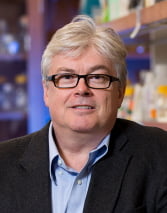Prof Stephen DALTON
 教授/全球創科學人
教授/全球創科學人
B.Sc. Hons., Ph.D.
電話: 3943 0537
電郵: Email住址會使用灌水程式保護機制。你需要啟動Javascript才能觀看它
Address: Room 223A, Lo Kwee-Seong Integrated Biomedical Sciences Building, Area 39, CUHK
ORCID: https://orcid.org/0000-0002-3450-1263
Career Opportunities
個人簡介
Prof. Stephen DALTON (杜卓勳) is a Professor in the School of Biomedical Sciences and has research interests in stem cell and developmental biology and the use of stem cells in regenerative medicine and therapeutic development. Prof. Dalton received his Ph.D. from the University of Adelaide in Australia, followed by post-doctoral research at the Imperial Cancer Research Fund in London with Sir Richard Treisman. Following this, Prof. Dalton joined Hoffman La Roche in Nutley, New Jersey and worked closely with large 'pharma' on a broad range of projects while at the Roche Institute for Molecular Biology. Then, after taking an academic position in Australia, Prof. Dalton moved to the University of Georgia where he was for 19 years. During this time, he was founding director of the Center for Molecular Medicine. At CUHK, Dr. Dalton continues his work in adult and pluripotent stem cell biology and has initiated a program focused on therapeutic development for type 2 diabetes using technology developed in his laboratory.
- Pluripotent and adult stem cells
- Cardiac development
- Brown and beige adipocytes
- Therapeutic development for type 2 diabetes
- Fagnocchi, L., Cherubini, A., Hatsuda, H., Fasciani, A., Mazzoleni, S., Poli, V., Berno, V., Rossi, R.L., Reinbold, R., Endele, M., Schroeder, T., Rocchigiani, M., Szkarłat, Ż., Oliviero, S., Dalton, S. and Zippo, A. (2016). A Myc-driven self-reinforcing regulatory network maintains mouse embryonic stem cell identity. Nat Commun., 7, 11903.
- Berger, R.P., Sun, Y.H., Kulik, M., Lee, J.K., Nairn, A.V., Moremen, K.W., Pierce, M. and Dalton, S. (2016). ST8SIA4-Dependent polysialylation is art of a developmental program required for germ layer formation from pluripotent stem cells. Stem Cells, 34, 1742-1752.
- Ter Huurne, M., Chappell, J., Dalton, S. and Stunnenberg, H.G. (2017). Distinct cell-cycle control in two different states of mouse pluripotency. Cell Stem Cell, 21, 449-455.
- Cliff, T.S., Wu, T., Boward, B.R., Yin, A., Yin, H., Glushka, J.N., Prestegaard, J.H. and Dalton, S. (2017). MYC controls human pluripotent stem cell fate decisions through regulation of metabolic flux. Cell Stem Cell, 21, 502-516.
- Dileep, V., Wilson, K.A., Marchal, C., Lyu, X., Zhao, P.A., Li, B., Poulet, A., Bartlett, D.A., Rivera-Mulia, J.C., Qin, Z.S., Robins, A.J., Schulz, T.C., Kulik, M.J., McCord, R.P., Dekker, J., Dalton, S., Corces, V.G. and Gilbert, D.M. (2019). Rapid irreversible transcriptional reprogramming in human stem cells accompanied by discordance between replication timing and chromatin compartment. Stem Cell Reports, 13, 193-206.
- Colunga, T., Hayworth, M., Kreß, S., Reynolds, D.M., Chen, L., Nazor, K.L., Baur, J., Singh, A.S., Loring, J.F., Metzger, M and Dalton, S. (2019). Human pluripotent stem cell-derived multipotent vascular progenitors of the mesothelium lineage have utility in tissue engineering and vascular repair. Cell Reports, 26, 2566-2579.
- Singh, A.M., Zhang, L., Avery, J., Yin, A., Du, Y., Wang, H., Li, Z., Fu, H., Yin, H. and Dalton, S. (2020). Human beige adipocytes generated from adipose-derived stem cells have utility for drug discovery and cell therapy of metabolic diseases. Nat. Commun., 11, 2758.
- ENCODE Project Consortium, Snyder, M.P., Gingeras, T.R., Moore, J.E., Weng, Z. et al. (2020). Perspectives on ENCODE. Nature, 583, 693-698.
- Grubert, F., Srivas, R., Spacek, D.V., Kasowski, M., Ruiz-Velasco, M., Sinnott-Armstrong, N., Greenside, P., Narasimha, A., Liu, Q., Geller, B., Sanghi, A., Kulik, M., Sa, S., Rabinovitch, M., Kundaje, A., Dalton, S., Zaugg, J.B., Snyder, M. (2020). Landscape of cohesin-mediated chromatin loops in the human genome. Nature, 583, 737-743.
- ENCODE Project Consortium, Moore, J.E., Purcaro, M.J., Pratt, H.E., Epstein, C.B., et al. (2020). Expanded encyclopedias of DNA elements in the human and mouse genomes. Nature, 583, 699-710.
- Zhang, L., Avery, J., Yin, A., Singh, A.S., Cliff, T.S., Yin, H. and Dalton, S. (2020). Generation of functional brown adipocytes through a directed developmental progression of human pluripotent stem cells. Cell Stem Cell, 27, 784-797.
- K.N., Kyle N., Zhao, P.A., Lyu, X., Sasaki, T., Bartlett, D.A., Singh, A., Tasan, I., Zhang, M., Watts, L.P., Hiraga, S-I., Natsume, T., Zhou, X., Leung, D., Kanemaki, M.T., Donaldson, A.D., Zhao, H. Dalton, S., Corces, V. and Gilbert, D.M. (2021). Replication timing maintains the global epigenetic state in human cells. Science, 372, 371-378.
- National Institute for General Medical Science (NIGMS) [PI; 01-Jan-15 – 31-Dec-20]: “Understanding mechanisms of human pluripotent stem cell self-renewal and cell fate determination”, (HK$70,992,500).
- National Institute for General Medical Science (NIGMS) [PI; 01-Jul-15 – 30-Jun-20]: “National Center for Biomedical Glycomics: Glycobiology of pluripotent stem cells”, (HK$9,336,000).
- National Human Genome Research Institute (NHGRI) ENCODE Consortium Pilot Project [PI; 01-Jul-19 – 30-Dec-20]: “Landscape of transcription in human and mouse”, (HK$1,244,800).
- Georgia Research Alliance (GRA): Technology seed grant - phase 1 [PI; 01-Jul-20 – 30-Jun-21]: “Cell-based screens for diabetes and obesity”, (HK$583,500).
- Nestle' Institute of Health Sciences (NIHS, Lausanne, Switzerland): Large Project Support [PI; 01-Jun-18 – 31-May-21]: “Technology development for generation of human thermogenic adipocytes”, (HK$5,057,000).
- University of Illinois/Abbott Laboratories [PI; 01-Oct 19 – 30-Mar-21]: “Understanding the effects of nutritional supplements on function and development of human neuronal cells”, (HK$4,714,680).
- Keck Foundation [PI; 01-Jul-16 – 31-Dec-17]: “The Glycomics of Human Neurodegenerative, Developmental, and Cognitive Disorders”, (HK$1,213,680).
